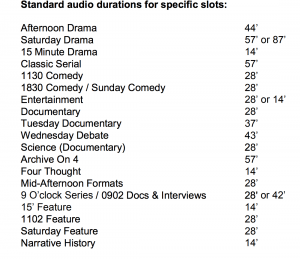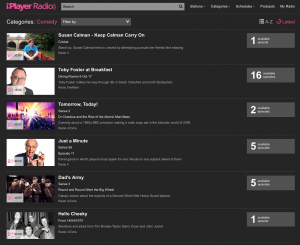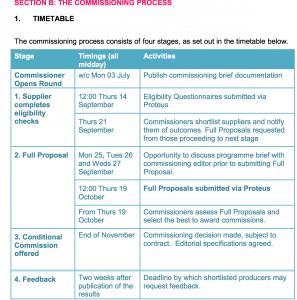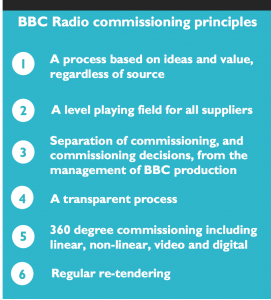We would ideally have this programme aired on BBC Radio 4, as this is where the largest amount of commissioning for comedy is on the BBC network as, as shown in BBC 4’s style guide, and by a search on the BBC Radio Iplayer site with the search being category
https://downloads.bbc.co.uk/radio/commissioning/radio-4-style-guide.pdf https://www.bbc.co.uk/radio/categories/comedy
This clearly shows that BBC Radio 4 has numerous opportunities for comedy on its network, however, the problem that we will encounter is that there are only comedy programmes for either 28 minutes or 14 minutes, meaning that we would most likely have to pitch our idea of a comical review of the year programme as an ad-hoc commision. This is due to the fact that the programme would not fit into the commissioning opportunities that are available to us without going via this route. This means that we would have now missed the deadline to have pitched this programme for December this year as if you look at any of the radio 4 commissioning briefs it states that the pitching process alone takes over 2 months meaning that we would need to pitch our programme at a much earlier time, however it will vary via programme.
https://downloads.bbc.co.uk/radio/commissioning/R4_Book_of_the_Week_Tender_Brief_Autumn_2017.pdf
The issue that we would encounter by pitching an ad hoc radio programme is that the remit for these is incredibly difficult, the BBC site itself says that ”Please note, however, that the scope for pitching between rounds is narrow. In comedy and drama it is extremely narrow and normally related to availability of talent. This in effect means that the BBC must be fully behind our idea and believe that we would have the talent capable to pull the idea of. Due to the reasons, I have just stated above this means that we would be very unlikely to get our programme aired on BBC Radio.
Before we even got to the stage of commisioning the programme we would first need to register to be a supplier for the BBC, this means doing the following:
- We would first need to register as a corporate entity
- Have someone on the team who has experience producing network radio
- Abide by BBC data protection law/ Willing to complete it
- Comply with the BBC technical guidelines, these being:
1.Source material in a linear format and not in a compressed format
2.Smooth edits, with mixes being ridden to give a consistent listening experience
3.Peaks shouldn’t exceed -1dBFS (decibels relative to full scale
4. PPM shouldn’t exceed 6 (peaks per minute)
5. The programme should have appropriate dynamic range
6. Should be delivered as a 48k, 16 bit wav.
http://www.bbc.co.uk/programmes/articles/3RbcfDspW85d2TRG42wwhTy/technical-specification
- Comply with the BBC terms of trade (general contr
- Comply with the BBC guidelines, these being:
Bribery: complying with the Bribery Act
Children: data protection
Release policy for secondary radio and on-demand exploitation
Commercial development of digital brands
Data protection: crew
Data protection: senior
Diversity & Inclusion Commissioning Guidelines
http://www.bbc.co.uk/programmes/articles/1jgMJfv7pSW8Cl4mHgxpc5y/policies-guidelines
http://www.bbc.co.uk/programmes/articles/1L6ff727k9rVTNbLY8cBHm5/becoming-a-supplier
Once we had become a supplier we would need to submit a 250-word proposal outlining the programme and the personnel involved so in our case myself and James Paul-Hunter with an estimated price of the programme.
http://www.bbc.co.uk/programmes/articles/4fC4NcVXqkZntJv8ZHpClD8/pitching-ideas
BBC Commissioning Principles and Framework
This outlines the way in which the BBC would act when we are pitching our idea to them. The first stage is the commissioning principles which aim to make the way the BBC act with both commercial production teams (such as ourselves) or in house teams as fair as possible and make sure that everyone has an equal chance.
The other part of the principles and framework that the BBC abides by in the commissioning process is the commissioning framework which sets out the way the BBC will act with producers and make sure that they are fair and transparent. The framework consist of 13 parts:
1.Commissioning Guidelines: Outlines the objectives of the BBC within the process and how the BBC will make sure that those interested stay informed and make sure that everything is clear.
2.Editorial Control: Outlines how the BBC final editorial control and all the content that is produced is subject to their guidelines and procedures.
3.Terms of Trade : The BBC’s Objectives are to secure rights to programmes and make sure that all that do work obide by the BBC’s terms of trade.
4.Multiplatform and Audience interaction: BBC will outline when it wants multiplatform content and will consult with the relevant editor to make sure the content is suitable.
5.Proposing/Pitching ideas: States the everyone has the opportunity to pitch and that what is required within the pitch is clearly stated alongside everything being confidential.
6.Programme Pricing: Outlines how the BBC value a programme, this is based on budget, value of the programme to the schedule, third party investment, rights acquired by BBC.
7.Payment: Outlines how the BBC will pay by a method of staged payments.
8.Development: Outlines that BBC doesn’t usually fund development, however in circumstances the BBC has the option to develop programmes, decide to commission, treat development costs as included in the programme price, have costs repaid if the bbc doesn’t commission and the programme goes to a rival
9. Business Affairs: Outlines how the BBC will pay and act fairly with independents
10.Equality, diversity, inclusion and ethics: BBC will make sure that all that It works with respect their employees and abide by anti discrimination law, health and safety etc.
11. Outlines how BBC commissioners will act: They will serve the audience all over the nation and treat each company fairly and will act in a timely manner and inform producers of the process and rough timescales, they will give feedback in a timely manner if workload allows.
12; Dispute resolution: Outlines how the BBC will act in a dispute situation
13: Review: The BBC will provide an annual report stating the numbers of hours of programmes competed for and the level of competition for them.




Leave a comment